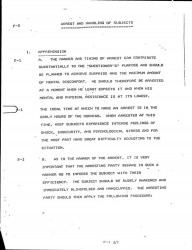 My current research project revolves around the use of torture in the so-called “War on Terror”—and I’m uncovering a wealth of astonishing, depressing material, much of it compliments of the U.S. government.
My current research project revolves around the use of torture in the so-called “War on Terror”—and I’m uncovering a wealth of astonishing, depressing material, much of it compliments of the U.S. government.
Here is a page from a top secret CIA manual on “Human Resource Exploitation,” distributed by CIA trainers in Latin America in the seventies and eighties (the full manual, along with its precursor, the notorious “KUBARK Counterintelligence Interrogation” manual from 1963, are available at the excellent National Security Archive). If you click the image for a larger version, you can read the CIA’s suggestions for the best way to arrest individuals hostile to the current government (say, labor organizers in Honduras):
The manner and timing of arrest should be planned to achieve surprise and the maximum amount of mental discomfort. He should therefore be arrested at a moment when he least suspects it and when his mental and physical resistance is at its lowest. Ideally in the early hours of the morning. When arrested at this time, most subjects experience intense feelings of shock, insecurity, and psychological stress and for the most part have great difficulty adjusting to the situation. It is also important that the arresting party behave in such a manner as to impress the subject with their efficiency.
Wow. This wouldn’t be out of place in some Gestapo training manual, would it? The CIA’s advised method–strike at dawn, be efficient, disorient your victim–reminds me of the so-called Dew Breakers of “Papa Doc” Duvalier’s ruthless regime in Haiti, the secret police who would come shortly before dawn (thus breaking the dew) to arrest and torture anyone who dared speak out against Duvalier. (Edwidge Danticat eloquently writes about one such officer of the Tonton Macoutes in her novel The Dew Breaker.)
My hats off to the CIA for their insights and inspiration to all those aspiring fascists out there. Way to export democracy, guys.